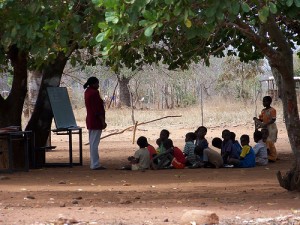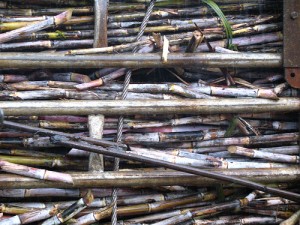In late December, the Council of Ministers of Mozambique made a significant announcement. A 30,000ha land concession to biofuels firm Procana in the District of Massingir had been revoked.
The Mozambican Land Law, passed in 1997, is quite unique. Land was nationalized at independence, and the Land Law did not change this. It gives the state clear tools for managing land use. Private sector investors must seek 50 year land-use rights agreements, known as DUAT, or “Land Use and Benefit Rights”. These DUATs are not binding for the full 50 years until after an interim two year period, when investors have to prove that they use the land productively.
The case of the Procana DUAT, a massive area bordering on the cross-border Limpopo National Park, was polemic from the beginning in 2007. Communities were to be resettled from the Park area to the lands then subsequently conceded to Procana for sugarcane production. These communities needed the lands for grazing, as they survive from cattle rearing. There appeared to be no real plan to deal with the brewing conflict. Moreover, there were worries that Procana's need for water would disturb local food production. Civil society groups supported the communities in their negotiations with Park officials through a project called Lhuvuka, but there appeared to be no progress with Procana.
Lhuvuka's website has an article that claims the conflicts were summed up [pt]
[…] na ausência de uma decisão firme por parte do governo face ao processo de reassentamento das comunidades vivendo no PNL; politização do processo de reassentamento das comunidades vivendo no PNL, sem respeitar todos seus direitos e interesses; uso abusivo da força por parte dos investidores, não respeitando os direitos básicos das comunidades previstos nas legislações moçambicanas por saberem que por detrás deles há sempre pelo menos um membro do governo que os protege e predominância de gestores mais virados para “yes mans” por temerem perder os cargos que actualmente ocupam.
Brazilian site “Reporter Brasil”, which has a focus on the social and environmental impact of biofuels, featured an article in early December which stated [pt]
Cerca de 30 mil hectares de savana nativa deverão ser convertidos em canaviais em Massingir, a região mais seca do país africano, provocando perda de biodiversidade e consumo excessivo de água (aproximadamente 409 bilhões de litros por ano para irrigação). E 38 mil moradores do entorno do Parque Nacional do Limpopo serão obrigados a deixar suas terras.
A Constituição de Moçambique decreta que todas as terras do país são propriedade do Estado, que pode conceder autorização de uso a empresas por períodos de 50 anos. Essa concessão, no entanto, está condicionada à ausência de comunidades tradicionais no território. Pelo jeito, lá, como no Brasil, boas leis não são garantia de boas práticas.
The Mozambican Constitution declares that all lands in the country are property of the State, which can concede land use to companies for periods of 50 years. This [particular] concession, however, is conditioned by the absence of traditional communities in the territory. Which means that, there, as in Brazil, good laws do not guarantee good practices.
(Reporter Brasil tips its hat to an article in Mother Jones magazine on Procana from March 2009.)
Prolific Mozambican blogger Carlos Serra featured the Procana story from the beginning in late 2007. The firm was originally half owned by multinational CAMEC, known as a mining/drilling company. CAMEC's founders were known for dealings in troubled places like South Sudan, DRC, and Zimbabwe. Serra wrote two years ago [pt]:
Mas convinha – este é um recado especial para o ministro da Agricultura, Erasmo Muhate -, também, estudar a trajectória de Phil Edmonds, chairman da CAMEC.
Serra again proved his worth as political and economic analyst when he seemed to warn in early December 2009 that the Government had turned against Procana.
Some online news stories claim that the principal investors in Procana lost confidence in the company earlier in 2009. The Government rescinded its land concession officially due its “lack of productivity” – having cleared only 800 ha of the total 30,000ha in its first two years of operation, falling way short in generating employment. As in any deal of this magnitude – originally estimated at over US $500 million – we can only assume that there were a host of political and economic considerations at play.
In his review of the Mozambican economic scenario, blogger Basílio Muhate found the Procana case an exception [Pt]
[…] as medidas de política económica levadas à cabo para fazer face as crises alimentar e financeira recentes, que incluiram subsídios aos pequenos agricultores e instalação de silos, os projectos da área de biocombustíveis iniciados em 2008 (A PROCANA foi uma excepção na medida em que pouco ou nada alcancou em relação às previsões), estão a ter impactos positivos no sector da agricultura
It is hard to detect whether the Procana case represents an interesting precedent for the management of land in the country – if the Mozambican government will scrutinize the ever-increasing number of land deals with foreign investors in the same way. Or whether the case merely represents an exception – and exceptionally bad performance on the part of foreign investment. Or both.
The author would like to make a disclaimer: she works for an international development agency that funded Lhuvuka's work, but has not worked directly with the project. She writes for Global Voices in a voluntary, personal capacity.









4 comments